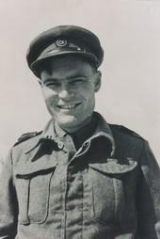
Eric Lloyd Williams
Encyclopedia
Eric Lloyd Williams was a South Africa
n-born journalist and war correspondent who covered World War II
for the South African Press Association
and Reuters
.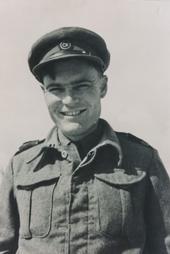 Lloyd Williams reported on the North African campaign
Lloyd Williams reported on the North African campaign
of the British Eighth Army, which included troops from India, South Africa, Australia and New Zealand, among others. He covered El Alamein
, the pivotal battle in 1942 that turned the tide in favour of the Allies in North Africa.
In 1943, Lloyd Williams entered the Libyan capital, Tripoli
, a key Axis base, on January 23, the day the Eighth Army captured it from the Germans. In May 1943, he entered Tunis
six hours after it fell to the Allies, with the surrender of all German and Italian forces in North Africa. Four months later he was with the Eighth Army when it invaded the toe of Italy from Sicily.
He earned the nickname Benghazi while reporting from North Africa. The Libyan port of Benghazi
, a vital supply town, changed hands several times during the course of the fighting in 1941-42.
In 1944 the Argus newspaper in Cape Town called Lloyd Williams "the outstanding South African war correspondent of this war".
In his obituary in 1988, the Herald newspaper in Port Elizabeth described him as "South Africa's most distinguished war correspondent of the Second World War".
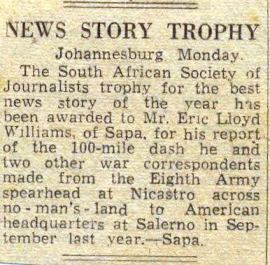 In his war journal he identifies one of the other correspondents as Daniel De Luce of Associated Press
In his war journal he identifies one of the other correspondents as Daniel De Luce of Associated Press
but does not name the third.
The three men borrowed an army jeep and drove 160 km from the Eighth Army spearhead at Nicastro to the headquarters of the American Fifth Army in Salerno, to the north. The journey took two days and nights. At the time the Fifth Army was meeting stiff German resistance and struggling to break out of its Salerno beachhead. The Eighth Army had assumed the role of a relief force.
At first the correspondents believed army vehicles were ahead of them. When they realised this was not so, they considered turning back. "But no - curiosity prevails and we decide almost together to push ahead and see around a few corners," Lloyd Williams wrote in his journal.
He described the terrain they travelled through as "wild hill country steep above the sea where there is a great feeling of loneliness". But there were little towns too, including the seaside village of Maratea, where they were welcomed with grapes and wine. They pressed on towards Salerno.
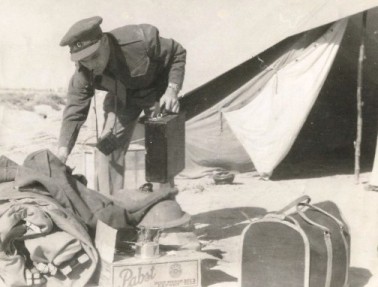 Once their identities had been established, the three correspondents reported to headquarters, providing information that helped the two armies to link up. They met General Harold Alexander, commander of the Allied armies in Italy, who shook their hands and told them, "Gentlemen, you have done something I would not have liked to attempt." That evening Lloyd Williams wrote: "Tonight the news of our arrival is all over the bridgehead area. The effect on the troops is wonderful. Everywhere they are saying, 'Well the Eighth Army's here.'"
Once their identities had been established, the three correspondents reported to headquarters, providing information that helped the two armies to link up. They met General Harold Alexander, commander of the Allied armies in Italy, who shook their hands and told them, "Gentlemen, you have done something I would not have liked to attempt." That evening Lloyd Williams wrote: "Tonight the news of our arrival is all over the bridgehead area. The effect on the troops is wonderful. Everywhere they are saying, 'Well the Eighth Army's here.'"
The following day, September 16, advance elements of the Eighth Army made contact with Fifth Army patrols outside Salerno, ending what one historian described as the first great crisis of the Italian campaign.
"It is undeniable that their recent journey might have resulted in the complete elimination of the whole party," Col. J V McCormack wrote in a letter circulated to war correspondents and army public relations officers, dated September 28.
"One determined machine gunner could have obliterated them in less time than it takes to dictate this."
He added that “escapades of this nature necessitate constantly leaving the road and taking cars over rough country”, placing an unnecessary strain on transport at a time when the chances of getting vehicles replaced were nil. He deplored the actions of the correspondents.
However, the colonel conceded that the three men had gathered valuable information:
"It has been recorded in a memorandum submitted by three correspondents that they carried out a very fine reconnaissance, for which the authorities were extremely grateful. I do not doubt this was the case..."
The editor of the Cape Times
congratulated him not only on the exploit but on his report of the journey, which he said all newspapers had carried prominently.
(SACS) in Cape Town, Grey High School
in Port Elizabeth and the University of Cape Town
. He began his career in journalism in 1938 when he joined the Argus in Cape Town. A year later he joined the Western Mail in Cardiff, Wales. He also had a stint on the Rhodesia Herald in Salisbury before joining the South African Press Association (Sapa) as a parliamentary reporter.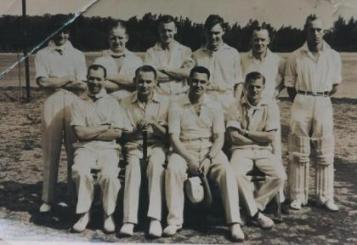
, Hampshire, where he died in February 1988 after a long illness.
He and his wife, Peggy, who died in 2001, were married for 46 years. They had three sons.
A violent dust storm
blows all today, carried along in a fierce ice-cold wind from the direction of the German lines west of Buerat...
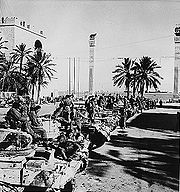 January 4:
January 4:
The dust storm which started yesterday increases its force today and life is pretty miserable. Dust has penetrated everywhere. It boils around in our tent, filling my bed, getting in my ears, eyes, mouth and down my back, and seeping all over my papers in the dispatch case. Outside it travels in hard hitting gusts, sailing past us to the sea where it hangs on the horizon, depressing and gloomy.
…The front is still quiet but about 1,000 enemy lorries are sighted moving south from the Misurata area and the enemy has strengthened his northern sector by a few more 88mms among the marshes.
We camp the night in a field 30 miles from Tripoli, right next door to Montgomery himself.
January 23:
We enter Tripoli
today. Our armoured cars got in at first light and we reached it soon after 9.30, coming in from the east and driving at one time along part of the famous grand prix circuit at Mellaha. Along here, too, come Valentine tank
s and hordes of lorries. We get a great reception from the Arabs who line the streets on the way into the centre of the town, clapping and saluting.
Tripoli is the usual Italian colonial town with a fine waterfront and dingy back quarters. There is not much bomb damage away from the docks but the bay is filled with wreckage and sunken ships including a hospital steamer, hit by bombs.
 Richard Dimbleby
Richard Dimbleby
, BBC: “He got caught up in a stupid army arrangement which insisted that he stayed at headquarters and wrote only what the general staff approved. Richard grumbled and complained. Then he went home…Make no mistake, Richard Dimbleby is a very courageous and a very gifted war reporter…you’ll be hearing him again, on his own terms, before the year is much older.”
Philip Jordan, News Chronicle
: “One of the world’s great correspondents. He would certainly have been one of King Arthur’s knights if he had lived in those days.”
Norman Soong, Chinese journalist: “He came straight from Chungking to cover the Eighth Army for the Chinese press. He didn’t have much in common with the rest of us except his hatred for any form of Fascism and his determination that the war should end with the defeat of Germany and Japan.”
Nestor Solodovnik, Tass News Agency, Moscow: “Today he is a Russian general, and a pretty efficient one at that. But only yesterday, it seems, he was sharing a jeep with me in Tunisia.”
John Gunther
: American journalist and author: “We used to call him the ‘Kentucky Colonel
’ because he looked like the typical Southern colonel as Hollywood presented him…His pockets bulge with slips of paper and thick notebooks, and he is forever recording everything of importance he hears.”
Quentin Reynolds
, Collier's Weekly
: “He wore an American Air Force cap that looked as though it belonged on a New York traffic cop. His face was always red and hearty. His jacket was always open. His belt was always fighting a losing fight to keep his ample stomach under control. He went in with the American Navy at Salerno, and when he came back he said, ‘Those guys are terrific. I’m a cynic but they break my heart.’"
Frank Gervasi
, Collier's Weekly
: “He went round Italy speaking fluent Italian to bootblacks and waiters who abound in southern Italy, asking them about Fascism. (He said:) ‘You can keep your Mussolinis and your Grand Fascist Council. These are the guys that have to make a go of things. You’ve got to get down to earth.'”
Robert Dunnett, BBC: “Has red hair, a melancholy face with kindly eyes. He’s rather short. You just can’t help loving the man. His heart is the size of a giant’s and there’s no one in Algiers he hasn’t done a kind turn for at some time or another.”
Frank Gillard
, BBC: “Works very hard and has no pretensions. He insists on driving his own recording truck about the front, and he stays up all night for the sake of getting an authentic recording of an artillery barrage.”
Christopher Buckley
, Daily Telegraph: “He tells everyone, even his best friends, that he always wanted to be a bishop because of the peace it would bring him, and also because he fancied himself in gaiters...He’s a great journalist.”
John Steinbeck
, American author: “Came out to Algiers to write about the ordinary people in the army. He used to come over to the war correspondents, all apologetic, because he said he felt he was a sham as a writer. Honest, sincere John Steinbeck.”
South Africa
The Republic of South Africa is a country in southern Africa. Located at the southern tip of Africa, it is divided into nine provinces, with of coastline on the Atlantic and Indian oceans...
n-born journalist and war correspondent who covered World War II
World War II
World War II, or the Second World War , was a global conflict lasting from 1939 to 1945, involving most of the world's nations—including all of the great powers—eventually forming two opposing military alliances: the Allies and the Axis...
for the South African Press Association
South African Press Association
The South African Press Association, commonly known as SAPA, is the national news agency of South Africa.-History:The agency was established on July 1, 1938, by major South African newspapers to facilitate the sharing of news. Reuters had dominated the internal supply of news in South Africa until...
and Reuters
Reuters
Reuters is a news agency headquartered in New York City. Until 2008 the Reuters news agency formed part of a British independent company, Reuters Group plc, which was also a provider of financial market data...
.

North African campaign
During the Second World War, the North African Campaign took place in North Africa from 10 June 1940 to 13 May 1943. It included campaigns fought in the Libyan and Egyptian deserts and in Morocco and Algeria and Tunisia .The campaign was fought between the Allies and Axis powers, many of whom had...
of the British Eighth Army, which included troops from India, South Africa, Australia and New Zealand, among others. He covered El Alamein
El Alamein
El Alamein is a town in the northern Matrouh Governorate of Egypt. Located on the Mediterranean Sea, it lies west of Alexandria and northwest of Cairo. As of 2007, it has a local population of 7,397 inhabitants.- Climate :...
, the pivotal battle in 1942 that turned the tide in favour of the Allies in North Africa.
In 1943, Lloyd Williams entered the Libyan capital, Tripoli
Tripoli
Tripoli is the capital and largest city in Libya. It is also known as Western Tripoli , to distinguish it from Tripoli, Lebanon. It is affectionately called The Mermaid of the Mediterranean , describing its turquoise waters and its whitewashed buildings. Tripoli is a Greek name that means "Three...
, a key Axis base, on January 23, the day the Eighth Army captured it from the Germans. In May 1943, he entered Tunis
Tunis
Tunis is the capital of both the Tunisian Republic and the Tunis Governorate. It is Tunisia's largest city, with a population of 728,453 as of 2004; the greater metropolitan area holds some 2,412,500 inhabitants....
six hours after it fell to the Allies, with the surrender of all German and Italian forces in North Africa. Four months later he was with the Eighth Army when it invaded the toe of Italy from Sicily.
He earned the nickname Benghazi while reporting from North Africa. The Libyan port of Benghazi
Benghazi
Benghazi is the second largest city in Libya, the main city of the Cyrenaica region , and the former provisional capital of the National Transitional Council. The wider metropolitan area is also a district of Libya...
, a vital supply town, changed hands several times during the course of the fighting in 1941-42.
In 1944 the Argus newspaper in Cape Town called Lloyd Williams "the outstanding South African war correspondent of this war".
In his obituary in 1988, the Herald newspaper in Port Elizabeth described him as "South Africa's most distinguished war correspondent of the Second World War".
Best news story of 1943
Lloyd Williams won the South African Society of Journalists trophy for the best news story of 1943 for a report on a dash through no man's land that he and two other correspondents made in Italy in September that year.
Associated Press
The Associated Press is an American news agency. The AP is a cooperative owned by its contributing newspapers, radio and television stations in the United States, which both contribute stories to the AP and use material written by its staff journalists...
but does not name the third.
The three men borrowed an army jeep and drove 160 km from the Eighth Army spearhead at Nicastro to the headquarters of the American Fifth Army in Salerno, to the north. The journey took two days and nights. At the time the Fifth Army was meeting stiff German resistance and struggling to break out of its Salerno beachhead. The Eighth Army had assumed the role of a relief force.
At first the correspondents believed army vehicles were ahead of them. When they realised this was not so, they considered turning back. "But no - curiosity prevails and we decide almost together to push ahead and see around a few corners," Lloyd Williams wrote in his journal.
He described the terrain they travelled through as "wild hill country steep above the sea where there is a great feeling of loneliness". But there were little towns too, including the seaside village of Maratea, where they were welcomed with grapes and wine. They pressed on towards Salerno.
Arrival at Fifth Army headquarters
Reaching the American perimeter on September 15, they were greeted with surprise and excitement. The territory they had passed through was thought to be in enemy hands; Italy had surrendered on September 3 but German forces controlled much of the country. One report says the correspondents were initially arrested as suspected enemy spies, although Lloyd Williams does not confirm this in his war journal.
The following day, September 16, advance elements of the Eighth Army made contact with Fifth Army patrols outside Salerno, ending what one historian described as the first great crisis of the Italian campaign.
Reprimand from military authorities
The Allied Forces Headquarters Public Relations Office responded by reprimanding the three correspondents for going ahead of vanguard combat troops and endangering lives."It is undeniable that their recent journey might have resulted in the complete elimination of the whole party," Col. J V McCormack wrote in a letter circulated to war correspondents and army public relations officers, dated September 28.
"One determined machine gunner could have obliterated them in less time than it takes to dictate this."
He added that “escapades of this nature necessitate constantly leaving the road and taking cars over rough country”, placing an unnecessary strain on transport at a time when the chances of getting vehicles replaced were nil. He deplored the actions of the correspondents.
However, the colonel conceded that the three men had gathered valuable information:
"It has been recorded in a memorandum submitted by three correspondents that they carried out a very fine reconnaissance, for which the authorities were extremely grateful. I do not doubt this was the case..."
Response from employers
Lloyd Williams' employers were more appreciative. Walton Cole of Reuters cabled him: "Best thanks for dispatch...That Reuter correspondent should be one prove personal enterprise still possible war corresponding gives great pride. FYI your dispatch incame London hours ahead others."The editor of the Cape Times
Cape Times
The Cape Times is an English language morning newspaper owned by Independent News & Media and published in Cape Town, South Africa. The first edition of the newspaper was published on 27 March 1876 by then editor Frederick York St Leger...
congratulated him not only on the exploit but on his report of the journey, which he said all newspapers had carried prominently.
Early career
Of Welsh descent, Lloyd Williams was born in Cape Town on August 30, 1915. He was educated at South African College SchoolsSouth African College Schools
The South African College Schools, commonly referred to as SACS, is a primary and secondary education institution located in Newlands, Cape Town, South Africa. Founded in 1829, it is the oldest school in South Africa and one of four schools expressly named by Cecil John Rhodes to offer an annual...
(SACS) in Cape Town, Grey High School
Grey High School
Grey High School is an elite school for boys located in the city of Port Elizabeth, Eastern Cape, South Africa. Grey High School is not to be confused with Grey College in Bloemfontein, Free State.-History:...
in Port Elizabeth and the University of Cape Town
University of Cape Town
The University of Cape Town is a public research university located in Cape Town in the Western Cape province of South Africa. UCT was founded in 1829 as the South African College, and is the oldest university in South Africa and the second oldest extant university in Africa.-History:The roots of...
. He began his career in journalism in 1938 when he joined the Argus in Cape Town. A year later he joined the Western Mail in Cardiff, Wales. He also had a stint on the Rhodesia Herald in Salisbury before joining the South African Press Association (Sapa) as a parliamentary reporter.

Post-war career
After the war, Lloyd Williams opened a North American bureau for Sapa in Washington DC, where he worked from 1946 to 1949. In 1949 he became a public relations officer for the South African Chamber of Mines. In 1957 he joined the Anglo American Corporation in a similar capacity, working initially in Johannesburg. The corporation posted him to Salisbury, Rhodesia (later Zimbabwe) in 1961, Lusaka, Zambia in 1964 and London in 1966. He retired in 1975 and settled in RomseyRomsey
Romsey is a small market town in the county of Hampshire, England.It is 8 miles northwest of Southampton and 11 miles southwest of Winchester, neighbouring the village of North Baddesley...
, Hampshire, where he died in February 1988 after a long illness.
He and his wife, Peggy, who died in 2001, were married for 46 years. They had three sons.
Dust storm, Libya, 1943
January 3:A violent dust storm
Dust storm
A dust / sand storm is a meteorological phenomenon common in arid and semi-arid regions. Dust storms arise when a gust front or other strong wind blows loose sand and dirt from a dry surface. Particles are transported by saltation and suspension, causing soil to move from one place and deposition...
blows all today, carried along in a fierce ice-cold wind from the direction of the German lines west of Buerat...

The dust storm which started yesterday increases its force today and life is pretty miserable. Dust has penetrated everywhere. It boils around in our tent, filling my bed, getting in my ears, eyes, mouth and down my back, and seeping all over my papers in the dispatch case. Outside it travels in hard hitting gusts, sailing past us to the sea where it hangs on the horizon, depressing and gloomy.
…The front is still quiet but about 1,000 enemy lorries are sighted moving south from the Misurata area and the enemy has strengthened his northern sector by a few more 88mms among the marshes.
Entering Tripoli with victorious Allied forces, January 1943
January 22:We camp the night in a field 30 miles from Tripoli, right next door to Montgomery himself.
January 23:
We enter Tripoli
Tripoli
Tripoli is the capital and largest city in Libya. It is also known as Western Tripoli , to distinguish it from Tripoli, Lebanon. It is affectionately called The Mermaid of the Mediterranean , describing its turquoise waters and its whitewashed buildings. Tripoli is a Greek name that means "Three...
today. Our armoured cars got in at first light and we reached it soon after 9.30, coming in from the east and driving at one time along part of the famous grand prix circuit at Mellaha. Along here, too, come Valentine tank
Valentine tank
The Tank, Infantry, Mk III, Valentine was an infantry tank produced in the United Kingdom during the Second World War. More than 8,000 of the type were produced in 11 different marks plus various purpose-built variants, accounting for approximately a quarter of wartime British tank production...
s and hordes of lorries. We get a great reception from the Arabs who line the streets on the way into the centre of the town, clapping and saluting.
Tripoli is the usual Italian colonial town with a fine waterfront and dingy back quarters. There is not much bomb damage away from the docks but the bay is filled with wreckage and sunken ships including a hospital steamer, hit by bombs.
Descriptions of fellow war correspondents
In a national broadcast on South African radio in February 1944, Lloyd Williams described some of the war correspondents he worked alongside in North Africa and Italy.
Richard Dimbleby
Richard Dimbleby CBE was an English journalist and broadcaster widely acknowledged as one of the greatest figures in British broadcasting history.-Early life:...
, BBC: “He got caught up in a stupid army arrangement which insisted that he stayed at headquarters and wrote only what the general staff approved. Richard grumbled and complained. Then he went home…Make no mistake, Richard Dimbleby is a very courageous and a very gifted war reporter…you’ll be hearing him again, on his own terms, before the year is much older.”
Philip Jordan, News Chronicle
News Chronicle
The News Chronicle was a British daily newspaper. It ceased publication on 17 October 1960, being absorbed into the Daily Mail. Its offices were in Bouverie Street, off Fleet Street, London, EC4Y 8DP, England.-Daily Chronicle:...
: “One of the world’s great correspondents. He would certainly have been one of King Arthur’s knights if he had lived in those days.”
Norman Soong, Chinese journalist: “He came straight from Chungking to cover the Eighth Army for the Chinese press. He didn’t have much in common with the rest of us except his hatred for any form of Fascism and his determination that the war should end with the defeat of Germany and Japan.”
Nestor Solodovnik, Tass News Agency, Moscow: “Today he is a Russian general, and a pretty efficient one at that. But only yesterday, it seems, he was sharing a jeep with me in Tunisia.”
John Gunther
John Gunther
John Gunther was an American journalist and author whose success came primarily in the 1940s and 1950s with a series of popular sociopolitical works known as the "Inside" books...
: American journalist and author: “We used to call him the ‘Kentucky Colonel
Kentucky colonel
Kentucky colonel is the highest title of honor bestowed by the Commonwealth of Kentucky. Commissions for Kentucky colonels are given by the Governor and the Secretary of State to individuals in recognition of noteworthy accomplishments and outstanding service to a community, state or the nation...
’ because he looked like the typical Southern colonel as Hollywood presented him…His pockets bulge with slips of paper and thick notebooks, and he is forever recording everything of importance he hears.”
Quentin Reynolds
Quentin Reynolds
Quentin James Reynolds was a journalist and World War II war correspondent.As associate editor at Collier's Weekly from 1933 to 1945, Reynolds averaged twenty articles a year...
, Collier's Weekly
Collier's Weekly
Collier's Weekly was an American magazine founded by Peter Fenelon Collier and published from 1888 to 1957. With the passage of decades, the title was shortened to Collier's....
: “He wore an American Air Force cap that looked as though it belonged on a New York traffic cop. His face was always red and hearty. His jacket was always open. His belt was always fighting a losing fight to keep his ample stomach under control. He went in with the American Navy at Salerno, and when he came back he said, ‘Those guys are terrific. I’m a cynic but they break my heart.’"
Frank Gervasi
Frank Gervasi
Frank Gervasi was world-renowned foreign correspondent and author. His books include To Whom Palestine?, The Case for Israel, The Real Rockefeller and The Violent Decade....
, Collier's Weekly
Collier's Weekly
Collier's Weekly was an American magazine founded by Peter Fenelon Collier and published from 1888 to 1957. With the passage of decades, the title was shortened to Collier's....
: “He went round Italy speaking fluent Italian to bootblacks and waiters who abound in southern Italy, asking them about Fascism. (He said:) ‘You can keep your Mussolinis and your Grand Fascist Council. These are the guys that have to make a go of things. You’ve got to get down to earth.'”
Robert Dunnett, BBC: “Has red hair, a melancholy face with kindly eyes. He’s rather short. You just can’t help loving the man. His heart is the size of a giant’s and there’s no one in Algiers he hasn’t done a kind turn for at some time or another.”
Frank Gillard
Frank Gillard
Frank Gillard CBE was a BBC reporter and radio innovator.-Early years:Gillard was born in Tiverton, Devon and attended Wellington School, Somerset. He gained a Batchelor's degree from St Luke's College, Exeter. He then taught in a private school.-Broadcaster:In 1936 he became a part time...
, BBC: “Works very hard and has no pretensions. He insists on driving his own recording truck about the front, and he stays up all night for the sake of getting an authentic recording of an artillery barrage.”
Christopher Buckley
Christopher Buckley (journalist)
Christopher Buckley was a British journalist and historian working for The Daily Telegraph newspaper.Buckley studied military history at Oxford before he started as a war correspondent in 1940. His reporting from multiple battles and front lines in World War II earned him international prestige...
, Daily Telegraph: “He tells everyone, even his best friends, that he always wanted to be a bishop because of the peace it would bring him, and also because he fancied himself in gaiters...He’s a great journalist.”
John Steinbeck
John Steinbeck
John Ernst Steinbeck, Jr. was an American writer. He is widely known for the Pulitzer Prize-winning novel The Grapes of Wrath and East of Eden and the novella Of Mice and Men...
, American author: “Came out to Algiers to write about the ordinary people in the army. He used to come over to the war correspondents, all apologetic, because he said he felt he was a sham as a writer. Honest, sincere John Steinbeck.”

